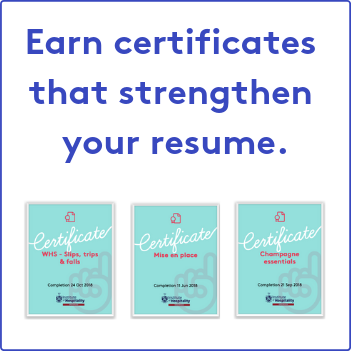Hospitality is a dynamic industry. There is always a job opening somewhere, but can you make yourself stand out from other applicants and actually swoop up that dream job?
Writing a hospitality resume that is strong and professional will increase your chances of getting the job. Here are some hospitality tips on how you can perfect your hospitality resume format and content.

Keep it short
One of the most common mistakes people make when writing a resume is making it too long. Unless you’ve worked in the industry for over 20 years gathering a range of different experiences, you’re probably best off keeping your resume to a two-page maximum. One page is even better for low entry positions such as kitchen hand jobs or service jobs.
Each job you’ve had doesn’t need a 150-word description. Most recruiters and managers skim-read resumes, so focus on highlighting your most important achievements and responsibilities. Using bullet points will make your resume easier to read, so don’t be afraid to leave some white space on the page.
Write a strong summary
Writing a summary or personal statement is often the hardest part of the resume writing process. It’s easy to slip in clichés like “I’m a highly motivated team player looking for a new challenge”, but those will likely put most recruiters to sleep.
Try to be authentic in your summary. Ask yourself what makes you a suitable candidate for the job and try to include that in your summary. What skills can you bring to the job? You definitely want to customize this part of the resume to the job you’re applying for.
Two or three sentences are usually enough for this section. An example of a hospitality resume summary could be:
Hospitality professional with 6 years of experience working in both small and large establishments of varying styles. Qualified barista who thrives in busy environments and has a strong drive to deliver an exceptional experience for every guest.
List your relevant work experience
After your summary statement, you’ll list your relevant work experience. If you’ve had a multitude of jobs, omit the ones that aren’t relevant for the role you’re applying for. If you’re fairly new to the hospitality industry but you’ve worked a retail job, then do include that in the list, and highlight the customer service skills you’ve gained in that position.
You’ll probably bold the job title and follow that with where that job was at. When listing the time frame for each role, including the month you started/finished at the job. Not doing so will only raise eyebrows.
Bullet point your main responsibilities
Rather than giving a detailed description of your work experience, bullet points your key achievements and responsibilities for each job. Tailor this to the job you’re applying for, and include the responsibilities that will be expected of you. If the ad states you’ll be expected to lead other staff, then highlight your management achievements in your last role.
You can incorporate some of the words that are used in the job ad, but obviously, be mindful that you don’t go overboard with it.
Example:
HEAD BARTENDER
Humble Hombre Bar / August 2014 – March 2015
- Supervising a team of 5 bar staff during busy weekend shifts
- Hiring and training new bar staff
- Managing beverage inventory and order sheet
- Designing a special cocktail program for the city’s Mexican festival
Need to skill up and learn new hospitality tips to land that dream job?

Typsy offers more than 1000+ hospitality short-video lessons, accessible anytime and anywhere.
Include your qualifications
Every resume has a qualifications section. This is where you’ll show off your diplomas, certificates and degrees.
If you’ve done relevant courses that would help you in the job, such as a first aid course, a Responsible Service of Alcohol course or maybe even an online social media course, add that in too.
Add a personal touch
Hospitality managers look for more than just skills in employees. Attitude and personality are just as important, especially in front-of-house staff. You can add some personal info to give employers a glimpse of your personality.
You could list projects or volunteer work you’ve done, or add a list of your personal interests at the bottom of your resume. You could also include a small photo of yourself at the top of the resume, but opt for a professional headshot and save that holiday selfie for your Facebook friends.
Don’t forget your personal details
Let the employer know where they can reach you, even if you’ve already included it in the application. Your personal details should go at the top of your resume. Leave things like date of birth and nationality of your resume. Although it is illegal for employers to discriminate, this information could subconsciously influence them in the hiring process. Your name, phone number, and email address suffice.
Clean it up
Your hospitality resume doesn’t need a fancy design. Just make sure it’s tidy and mistake-free. When you’re finished writing your resume, have thorough proofreading to fix any spelling or grammatical errors. Then save it as a PDF for online applications and save an editable version to customize for different jobs.
